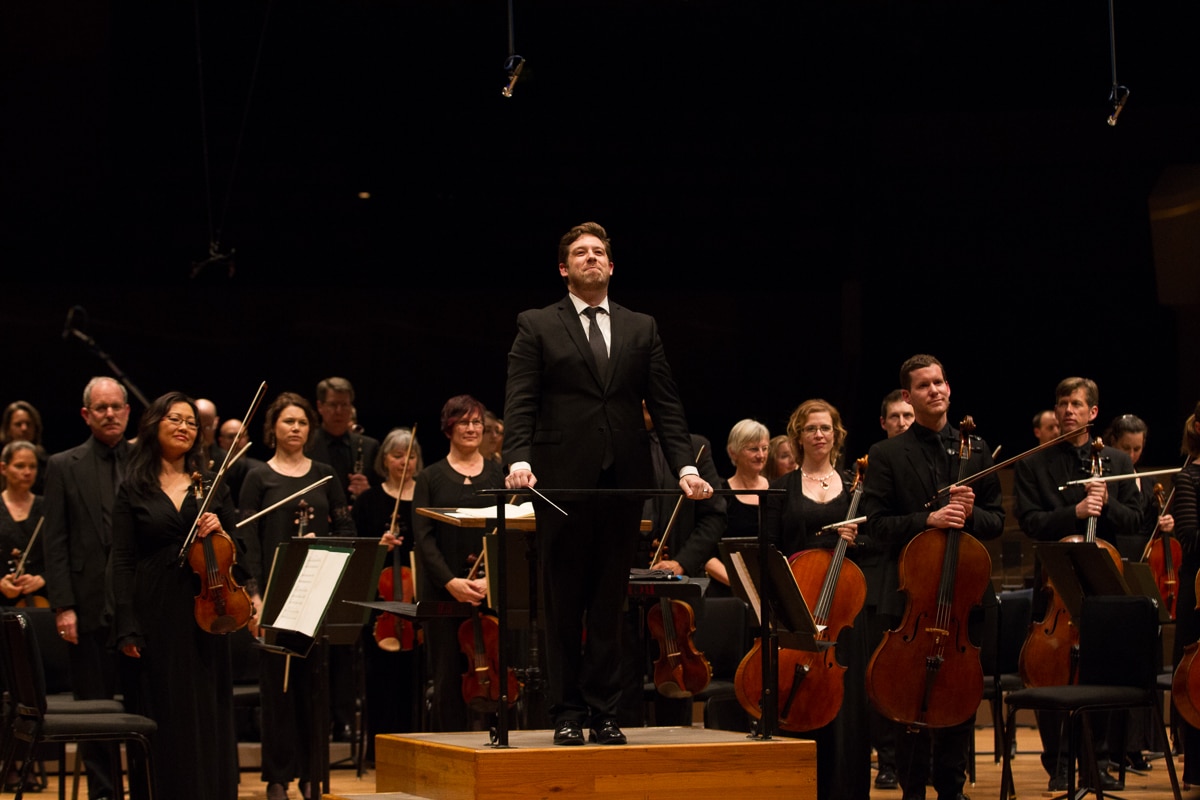On this week’s episode
- Judith McIntyre Galecki shares the life of a full-time classical musician.
- As a cellist in the Colorado Symphony, Judith performs every weekend of the company’s season, playing everything from the old classics to live music that accompanies movie screenings.
- Judith shares the difficulties of her job, as well as why she loves what she does and has devoted her life to it, since she’s been playing the cello since she was seven-years-old.
About the show
You Have a Cool Job is a podcast hosted by Taylor Sienkiewicz from Peterson’s. The show highlights professionals who have a unique, interesting, uncommon, or otherwise cool job.
Our goal is to motivate you and show how interesting, fulfilling, and anything-but-average your career can be, and we’ll do this by talking with people who took a path less traveled. We ask these fascinating individuals how they got to where they are in their career based on their education, experience, and influences; why they love their job; and lots more.
Want more?
If you like what you’re hearing, check out these resources to get plugged in.
For more episodes of You Have a Cool Job, visit our YouTube channel. View other podcast blogs here.
Subscribe to receive an email containing each podcast episode of You Have a Cool Job as they’re released.
Learn more about Judith’s work with the Colorado Symphony here.
Have a nomination for the show? Drop a line here.

Episode 5 Transcript
HOST SHOW INTRO: Welcome to the show! From Peterson’s I’m Taylor Sienkiewicz, and you’re listening to “You Have a Cool Job”, a podcast highlighting those who took their profession in a unique direction, and what they did to get there.
THEME MUSIC
HOST INTRO: On today’s episode of “You Have a Cool Job,” we talk to Judith McIntyre Galecki, a cellist in the Colorado Symphony. Judith’s work includes travel, physical demand, and a lifelong devotion to music. She explains her role in the orchestra.
JUDITH MCINTYRE GALECKI: I’m one of the cellists in the Colorado Symphony so I play concerts from September to May as well as the summer concert series in July and my position is officially third chair, there’s like a hierarchy.
HOST: But Judith’s rank as third chair is fluid as she can step in and out of positions based on when and where she’s needed.
JUDITH MCINTYRE GALECKI: I’ve been acting principal last season and this season because we don’t have the first and second chairs filled so it’s my job to move up and assume that role if needed. But, it’s different from other businesses where seniority just assumes that you move up. It’s a totally different audition for somebody that comes in and wants to be the principal cellist.
HOST: For those of us who aren’t familiar with the orchestral music scene, it can seem like a whole other world. I asked Judith what her job looks like day to day.
JUDITH MCINTYRE GALECKI: Actual job requirements, I have a schedule of rehearsals and concerts that we get at the beginning of each season and that usually looks like Wednesday morning rehearsals, Thursday afternoon rehearsals, Friday morning rehearsal, then we have concerts Friday night, Saturday night, and then Sunday matinee. And, it’s assumed that I show up at the first rehearsal prepared and ready to go so I have a lot of practicing that I have to do on my own in order to learn all the repertoire because we have concerts each week and sometimes we have two or three different programs in one week depending on what the concert is like if we have a…children’s concert, then we might have two or three different programs, and then the masterworks, which is more classical is, you know we have one program for that week and then three concerts for the same program.
HOST: Aside from the music itself, Judith’s work takes her to some of the country and world’s most beautiful places.
JUDITH MCINTYRE GALECKI: These orchestral musicians often do different festivals all over the country and all over the world and the one that I do every summer now is based in the Tetons it’s just outside of Jackson and it’s an orchestral festival as well as chamber music and it’s made up of, the orchestra’s made up of orchestra’s all over the country and actually all over the world. There’s a few that come in from Europe or Asia and we get together and we are there for a week or two, some more, and it’s like a seven week long festival and we play together and hike and swim in the lakes and do all the fun things that are available there and then we come together and play beautiful music and sometimes there’s chamber music concerts that are part of the festival and it’s just a really fun opportunity. It’s like music camp for grown ups so it’s a fun way to see each other and play music and do fun things.
HOST: After a description of an orchestra event with a Teton backdrop, I wanted to hear about more of Judith’s travels. Can you describe one of the most unique festivals that you’ve been to?
JUDITH MCINTYRE GALECKI: Well, I’ve done a couple really fun festivals. I used to play in a new music festival in Santa Cruz, California and I went there for two weeks every August for a few years and this festival is, basically, all the music that we played there, the ink was still wet on the page and all living composers and they had just composed the piece and oftentimes for the festival they were often commissioned to write a piece for the festival and usually it was really hard stuff but really fun as well to experience new sounds but sort of the cutting edge of classical music in today’s world.
HOST: As far as international travel, Judith described more gorgeous mountain settings.
JUDITH MCINTYRE GALECKI: The other festival I used to do when I was younger was in Switzerland in the Alps and it was in this tiny little ski town called Verbier and it was halfway up a mountain and people from all over the world, students, would make up the orchestra and they chose a few people from countries from all over the world and it was incredible to experience that sort of multiculturalism in this tiny little town and also the quality of artists, there would just be star players coming in and playing with the orchestra and playing chamber music in their own concerts and you’d see them wandering around the town and it was just such a fun environment to be in for the summer.
HOST: So Judith, you talked a little bit about some of the music being more challenging at that festival what would you say is the most challenging part of your job.
JUDITH MCINTYRE GALECKI: I would think as an orchestral player, like a full time orchestral player, what I think is the most challenging is the sheer volume of music that you’re going through week after week after week and you just have to stay on top of it.
HOST: Despite the years of experience Judith has, new music and changes in style keep her on her toes.
JUDITH MCINTYRE GALECKI: I mean I’ve been doing this for a number of years now so I’m familiar with most of the repertoire but every once in awhile you get a few new pieces and you have to really learn the notes and learn how it goes and then next week you have another set of pieces that you have to learn and perform and that following week you have a children’s concert or we played with Leslie Odom Junior earlier this month and then we have Halloween shows and then we’re playing the music soundtrack to movies and then they show the movie like Harry Potter or Nightmare Before Christmas or the Rocky Horror Picture Show and it’s super fun but it’s a lot of music and especially the movies are really challenging because you have to really be alert and not only can the music be quite difficult but you have to really be alert so that you’re paying attention because it has to line up with the screen so there’s that challenge and then, you know, it’s just the sheer volume of repertoire that you’re going through all the time you just have to be on top of it.
HOST: Right, how often do you practice then?
JUDITH MCINTYRE GALECKI: Everyday, I mean I’m always preparing for something and I might take a day off here and there especially if I’ve had a few weeks of really intense work. I mean, you have to protect your body, you know it’s like any athlete we just use different muscles depending on which instrument you play. So you have to really be smart about how you’re using your body, exercising and eating right, so that you can be in top performing shape all the time I guess it’s kind of like sports teams. You know, they have to be at practice and they have to take care of their bodies and they have to sleep right and they have to keep their A-Game going all the time.
HOST: That’s an interesting point, how do you try to do that then because a cello is a large instrument so what do you do to physically prepare for it?
JUDITH MCINTYRE GALECKI: I do a lot of stretching and I walk and exercise when I can but just to keep myself limber is the main thing especially because I’m sitting a lot but I’m sitting and moving in a specific way. So, I have to make sure that my shoulders are relaxed and my neck is relaxed and I’ve stretched out a little bit, especially my forearms and my shoulders because especially when you’re concentrating really hard you get tight like if someone’s sitting at a computer their shoulders go up but you can’t have your shoulders go up when you’re playing an instrument even though you’re concentrating really hard so there’s this fine balance of highly focused attention and you have to have control over your body so your controlling the right things and you’re maintaining this relaxation as well as staying in touch with the emotion music so it’s just a whole package deal that you have to work on.
HOST: The career of a musician is often one that starts at a young age, and this is true for Judith. She shared her musical background and path to the Colorado Symphony.
JUDITH MCINTYRE GALECKI: I’ve been in the orchestra actually since 2003, I’ve been doing it for several years before that I was freelancing a little bit at various little orchestras. I was at school in New York and then I was at school in Toronto and I basically have been playing the cello since I was seven years old and before that I was studying violin for a few years I picked it up. Children who are studying classical instruments, they usually do a Suzuki method which is very, very popular for children learning an instrument and I actually came from a musical family so it was kind of like a lifelong study and a lifelong journey of studying music and being immersed in the different pieces and the different styles and the different instruments in my house where my sisters played the violin and my parents were pianists and things like that.
HOST: The family influence of an instrument, sport, or other activity resonates with many families. I asked Judith how exactly this musical family influence affected her.
JUDITH MCINTYRE GALECKI: Well, a lot of different ways and in different ways throughout my life. I grew up listening to my sisters play violin and I started on the violin and then I decided that I needed to do my own thing and my parents were very involved in our musical education so instead of going to play soccer on Saturdays we bundled up our instruments in the car and went to music instruments or youth orchestra or whatever kind of study was being offered at that time and we practiced every day and went to lessons every week and just got used to the discipline of learning an instrument and as I got older, my dad was a musicologist and was a professor of music for years and years and years and we would have lengthy discussions about different composers and major pieces and musical gossip and different politics that you run into in the business.
HOST: Since musicians start at an early age and devote much of their life to their work, you can guess that the industry is just a little competitive.
JUDITH MCINTYRE GALECKI: The audition process is incredibly competitive because only a number of maybe 10, 15 positions open for an orchestra in this country and you can have anywhere from thirty to 300 people coming out for the position and you have a list that you prepare and you do your best and you have 10 minutes to play in the first round and most people get cut and then hopefully you come back to play in the remaining rounds. I was really happy to win the position that I have and be able to join a full-time position.
HOST: So, how do you think people should respond if they do get cut but they want to keep trying to work in the industry.
JUDITH MCINTYRE GALECKI: Well you know the audition process is like a whole other subject. Aside from just the job, people are coming up from all different kinds of blogs and articles and programs all devoted to audition preparation because it is such a competitive thing. So, when I was on the audition circuit I had to approach it like this is a learning experience. I had the standard list of repertoire that you need to perform for most auditions and I just kept practicing them and every time that I did an audition I would file away the experience and just approach it like I’m going to learn something in this and I kept learning and learning and getting better until I won one. And, even after you win one you may want a bigger job and you keep auditioning but I think the main thing is just using it as a growth experience and just keeping at it and adding it to the wealth of information and experience that you’ve had throughout your life to become a better musician.
HOST: After hearing about a cutthroat audition process and a background devoted to music, I wanted to know what kept Judith motivated and inspired both then and now.
JUDITH MCINTYRE GALECKI: I love playing the music and the different repertoire keeps me really interested and just being able to connect musically with other people, the conductor and the other musicians on stage and the audience and hearing how they respond to different pieces that I love especially is just an incredible feeling when it’s really good especially.
HOST: While Judith shared her personal story, she explained that most of the people who surround her on an orchestral stage have a similar background, forming a close-knit community.
JUDITH MCINTYRE GALECKI: You know what makes my field unique is the people who are in my field or in the orchestras throughout the country and I don’t just play in the orchestra I also teach cello and play a lot of chamber music and things like that. Most of the people have been doing it since they were children and our specialization is equivalent to that of a neurosurgeon because we’ve been doing it for so long and we’ve been studying it for so long so when you go to an orchestra you’re basically watching a stage of 80 to 100 musicians who have been doing this their entire lives and have devoted their lives to this art and the repertoire and learning the skills to produce the most beautiful music that they can and I think it’s just so fun to be a part of that community.
HOST: As for final thoughts, Judith left us with some insight about her musical future.
JUDITH MCINTYRE GALECKI: Really I mean I’m going to be studying it for the rest of my life and hopefully always improving. You know, it’s like any art form you just are striving for an ideal.
HOST: Judith’s career as a musician contains elements of art, travel, and community as well as physicality and rigor. As this age-old career of music continues to push at it’s boundaries, Judith is at the root of it all, influencing people through both old and new. We hope you’re inspired by Judith’s story and are able to find something you’re equally passionate about, no matter what age you find what exactly that is. Thanks for tuning in, we’ll see you next week.
THEME MUSIC



